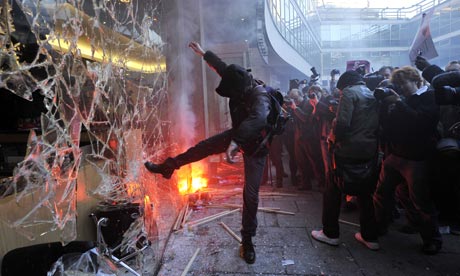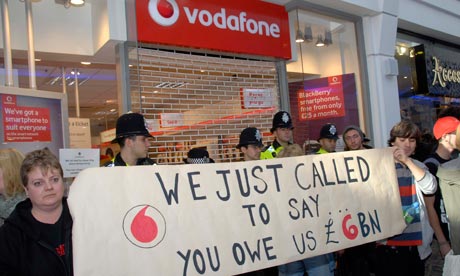"The death of democracy is not likely to be an assassination from ambush. It will be a slow extinction from apathy, indifference, and undernourishment."
Robert M. Hutchins, 1899-1977
A recent comment response to a post on this humble blog came with a call to "live with the result and don't whine about it" as "What's been done is not illegal, it may be slightly shady but that's life." While loath to get into the specifics of the nature of the call, or indeed the blog post in question, this response, rather than anger or irk, saddened me as it is symptomatic of widespread attitudes towards activism or, to put it more generally, caring within today's world.
Not long after the comment appeared, around about six weeks ago I began writing this post. It was primarily influenced by this, but also to a general sense of impotence which seemed to be arising around certain issues: for instance the lack of reaction to a student protest petition against proposed redundancies at Grays School of Art, with The Robert Gordon University's acting principal John Harper's response nothing more rather dismissive rhetoric and an empty statement to the effect that "I’m confident that the recommendations will ensure that the University continues to produce a steady stream of talented graduates who will drive the regional creative and cultural economy." The assurance that "Further consultation sessions with students will be arranged at the appropriate times" seemed enough to dissuade a number of students from taking the matter any further feeling it was outwith their control.
I was, at the time, poised to write a post discussing this, and also the binds of non-disclosure agreements which restrict academics disclosing their opinions of the growing corporation of Universities and education and the general levels of apathy which have dominated the British Public. However, I focused on another set of topics I believed more pressing at the time before returning to this post in an attempt to get it down, when this happened:
 |
| Millbank Tower Protests - Photograph: Ray Tang/Jonathan Hordle/Rex Features |
The Guardian's John Harris argues that while indeed it was a small minority who brought the violence with them, it was not a small minority who had marched on Millbank Tower: "You had only to look at the crowd to know that the vast majority of them were not anarchists, but reasonably regular twentysomethings. As if to illustrate the point, when one of the people on the roof made the stupid decision to hurl down a fire extinguisher, they were met with an outraged chant of "Don't throw shit! Don't throw shit!"" Going on, Harris quotes an exchange from a colleague who had spent the day at Millbank "talk of cynical provocateurs, he said, was "nonsense": the crowd was made up of "ordinary students who were viscerally angry", but also mindful of what was ill-advised, or plain daft. When one of their number had prised up a cobblestone and moved to lob it at the police, he had been roundly told to "stop being an idiot.""
While I am certainly not going to condone or advocate violence on this blog, whether be towards a protester, innocent or police officer who is merely doing their job, I will say that it is something I can understand, and something which was justified in a statement from lecturers at Goldsmith's College "The real violence in this situation relates not to a smashed window but to the destructive impact of the cuts." Anger and discontent is widespread and rising amid the lies and hypocrisy being espoused by those in government and the rapid and alarming breakdown of the basic principals of democracy. It seems the democratic process only comes into force once every four or five years (depending on jurisdiction) when an election approaches and the general population is required to see one party (or two as is currently the case) into power. Even then this year's UK elections have seen even the polling booth to be a hollow gesture where the thoughts and opinions of the voters mean nothing, given the Liberal Democrats finding themselves in a position to turn the tide of political governance mostly based on a pledge which they apparently planned to drop regardless of the outcome. It is unseen how a Lib Dem pre-election pledge which did get through, the "powers of recall" will effect the Liberal Democrat mandate to govern, but it is very clear that the student occupation of Millbank tower was "just the beginning."
 |
| UK Uncut protest in Brighton. Photograph: Howard Davies/www.reportdigital |
As the demonstrations have grown in numbers and frequency, UK Uncut have widened their targets, moving on to tackle high-street chain, Topshop, and in particular its founder Philip Green who is also accused of Tax Avoidance. UK Uncut claim that "In 2005 Philip Green awarded himself £1.2bn, the biggest paycheck in British corporate history. But this dividend payout was channeled through a network of offshore accounts, via tax havens in Jersey and eventually to Green’s wife’s Monaco bank account. The dodge saved Green, and cost the tax payer, close to £300m." Green in particular has been targeted as he was in august appointed to "lead an efficiency review of government spending" while Liberal Democrat MPs called for an investigation into his tax dealings.
As the commons vote on the tuition fees on 9th December approached two more protests occurred on the 24th and 30th in the capital with many more emerging across the country. Following from the Goldsmith's College Occupation last month, students across the country began to occupy their University buildings and for the first time pupils occupied their schools in protest as the biggest demonstration march approached to coincide with the crucial vote. Despite Downing Street's condemnation of lecturers who had supported the protests at Millbank, lecturers, trade unionists and schoolchildren joined the students in the protests last week. Following criticism of the policing of the protests a month earlier, the Metropolitain Police were infinitely more prepared for the trouble which emerged when the protest again deviated off course and saw thousands of protesters enter Parliament Square.
The Guardian's live blog of the day can fill in most details as they happened. As the protesters broke into Parliament Square the Police switched to riot gear and began employing the controversial "kettling" technique to contain the protesters in one area. In practice, however, it appears to have exacerbated the situation, creating a bottleneck and effectively trapping people - including teenage schoolchildren - within the Square. Student groups came out accusing the police tactics of provoking violent reaction, with the Guardian's live reaction blog highlighting cases of apparent contempt from Police towards protesters, reports of police dragging a cerebral palsy sufferer from his wheelchair (video, below), and student Alfie Meadows, a 20 year old protester "suffered bleeding to the brain when he was struck by a police truncheon during the tuition fees protest." A few days after the protest a video emerged showing an officer policing the protest without displaying her shoulder ID, following the death of Ian Tomlinson at the G20 protests in 2009 Metropolitan Police Commissioner had condemned the action: “I have made it absolutely clear that it is absolutely unacceptable for any officer who should have identification numbers on not to have those identification numbers on.”
Following last week's protests, Sir Hugh Orde, president of the Association of Chief Police Officers stated that the repeated clashes with protesters and demonstrators would begin to threaten the reputation of the police "if it is allowed to be played as the cops acting as an arm of the state, delivering the elected government's will, rather than protecting the rights of the citizen." While the policing of these events is part of the Job description, the increasing conflicts, questionable tactics and growing discontent are bound to erode the relationship between the police and the general public, it wont be long before discontent spreads into the police ranks. Police Forces throughout the country are not immune to the same round of cuts which are angering students, with warnings that "40,000 officers would lose their jobs if the police budget was slashed by 25%" and Home Secretary Theresa May telling Met Commissioner Paul Stephenson to "brace for an 11 per cent cut in government funding over the next two years."
As the police launch an investigation into the events of 9th December, with students blaming police tactics for the violence, and the police and government condemning a "significant number [who] came intent on violence", however will the investigation pinpoint who is really provoked and caused the violence and protests: the Coalition Government?
When you look beyond the media emphasis on violence which undermines the voices of campaigners and masks the real issues, that of a systematic dismantling of the education system and the UK Government's unflinching bias towards big business.The Government continues to hand over policy-making roles to representatives from business such as Philip Green and ignore the wishes of the voters, including inviting fast food giant MacDonalds to inform public health policy. Education is not simply a tool to be used by commerce or business in order to train workers into functional obedience. A day after the Government voted through the rise in fees a statement from CBI Director General Richard Lambert states "business will have to play a much more active role than it has in the past in informing students about its likely future needs" even going further to suggest that business should be influencing which courses Universities offer and steering the choices which students have to make much earlier. Society as a whole benefits from an educated populous, it is a right and not a privilege, which drives forward innovation and invention and should be free and accessible to all.